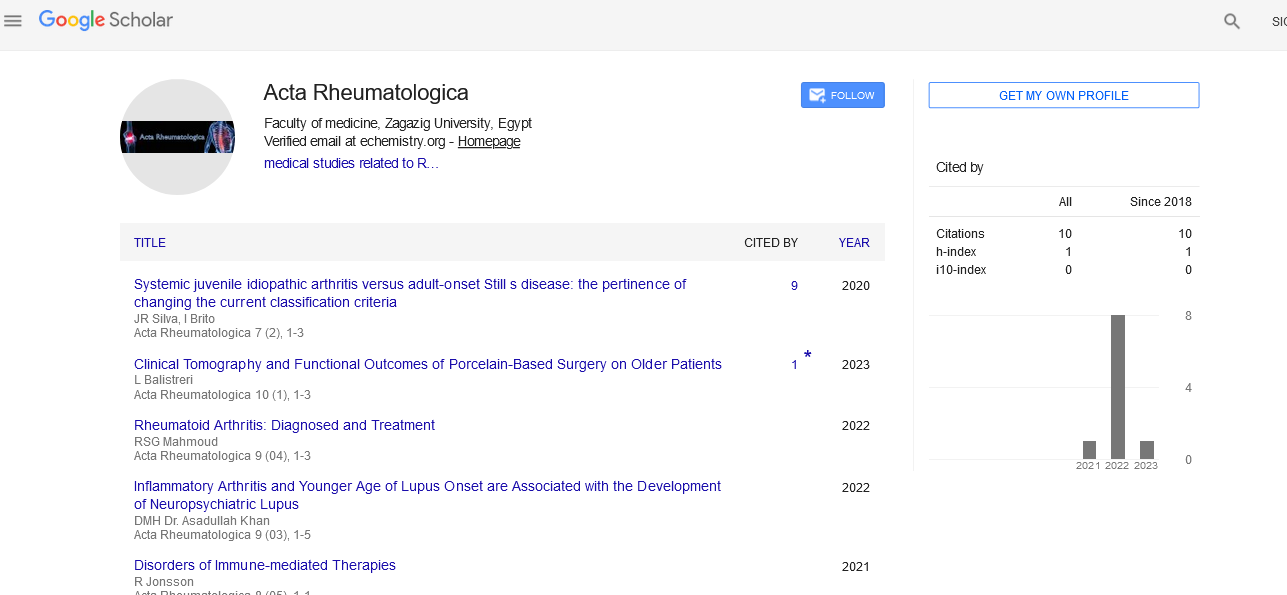Perspective - (2024) Volume 11, Issue 5
The Role of Gut Microbiota in Autoimmune Rheumatic Diseases
Maria Pasali*
Department of Health Care, University of Ioannina, Ioannin, Greece
*Correspondence:
Maria Pasali, Department of Health Care, University of Ioannina, Ioannin,
Greece,
Email:
Received: 09-Sep-2024, Manuscript No. IPAR-24-15210;
Editor assigned: 12-Sep-2024, Pre QC No. IPAR-24-15210 (PQ);
Reviewed: 26-Sep-2024, QC No. IPAR-24-15210;
Revised: 07-Oct-2024, Manuscript No. IPAR-24-15210 (R);
Published:
15-Oct-2024
Introduction
Autoimmune Rheumatic Diseases (ARDs) encompass a diverse
group of disorders characterized by the immune system
mistakenly attacking the body’s own tissues. Examples include
rheumatoid arthritis, systemic lupus erythematosus, and
scleroderma. While genetic and environmental factors
contribute to the development of these conditions, increasing
evidence suggests that gut microbiota the trillions of
microorganisms residing in our intestines play a crucial role in
the pathogenesis and progression of ARDs.
Understanding gut microbiota
The gut microbiota comprises a complex community of
bacteria, viruses, fungi, and other microorganisms that inhabit
the gastrointestinal tract. These microbial communities are not
merely passive residents; they actively participate in various
physiological processes, including digestion, metabolism, and
immune function. The gut microbiome helps maintain
homeostasis by influencing the development of the immune
system and protecting against pathogens.
The gut-immune connection
The gut is intricately connected to the immune system,
accounting for approximately 70% of the body’s immune cells
residing in or near the gut. This connection is largely facilitated
by the Gut-Associated Lymphoid Tissue (GALT), which plays a
pivotal role in immune responses. The gut microbiota can
modulate the activity of immune cells, shaping both innate and
adaptive immune responses.
Disruptions to the gut microbiota referred to as dysbiosis can
lead to an imbalance in immune function. This dysbiosis has
been linked to the development of several autoimmune
conditions, as it can trigger inappropriate immune responses.
For instance, an altered microbial composition may lead to an
increase in pro-inflammatory cytokines, contributing to chronic
inflammation characteristic of ARDs.
Evidence linking gut microbiota to ARDs
Recent research has revealed significant differences in the gut
microbiota of individuals with autoimmune rheumatic diseases
compared to healthy controls. Studies have shown a reduction in microbial diversity and specific beneficial bacterial populations,
such as the Firmicutes and Bacteroidetes phyla, in patients with
rheumatoid arthritis and systemic lupus erythematosus. These
alterations may exacerbate inflammatory processes and
promote autoimmunity.
One noteworthy study found that patients with rheumatoid
arthritis exhibited higher levels of certain pathogenic bacteria,
including Porphyromonas gingivalis, which is known for its role
in periodontal disease. This association raises the question of
whether periodontal pathogens might influence systemic
inflammation and joint health.
Moreover, research has suggested that specific microbial
metabolites, such as Short-Chain Fatty Acids (SCFAs), are
diminished in individuals with ARDs. SCFAs, produced through
the fermentation of dietary fibers by gut bacteria, have anti-inflammatory
properties and play a vital role in regulating
immune responses. Their deficiency may lead to increased
intestinal permeability, often referred to as "leaky gut," allowing
for the translocation of bacterial products into the bloodstream,
which can further trigger systemic inflammation and
autoimmunity.
Description
Mechanisms of interaction
The interaction between gut microbiota and the immune
system involves several mechanisms:
Regulation of immune responses: Gut microbiota can
promote the differentiation of regulatory T cells (Tregs), which
help maintain immune tolerance and prevent excessive immune
reactions. Dysbiosis may hinder this process, resulting in a
failure to control inflammatory responses.
Modulation of inflammation: Certain gut bacteria produce
metabolites that can either promote or inhibit inflammation. For
example, butyrate, an SCFA, has been shown to suppress the
production of pro-inflammatory cytokines and support intestinal
barrier function.
Influence on autoantibody production: Dysbiosis can also
affect the production of autoantibodies, which are often found
in ARDs. For instance, altered microbiota profiles may lead to
increased levels of specific autoantibodies, contributing to
disease progression.
Genetic and environmental interactions: The interplay
between genetic predisposition and environmental factors, such
as diet and antibiotic use, further complicates the relationship
between gut microbiota and ARDs. These factors can influence
the composition of gut microbiota, which may in turn interact
with genetic risk factors to trigger autoimmune responses.
Therapeutic implications
Understanding the role of gut microbiota in ARDs opens up
potential avenues for therapeutic intervention. Probiotics and
prebiotics, which aim to restore a healthy microbiota balance,
are being explored as adjunct therapies. Preliminary studies
suggest that specific probiotic strains may help reduce disease
activity in rheumatoid arthritis patients by modulating immune
responses and decreasing inflammation.
Dietary interventions, particularly those rich in fiber and
fermented foods, can also support a diverse and beneficial
microbiota. Such dietary changes not only enhance gut health
but may also positively influence immune function.
Furthermore, Fecal Microbiota Transplantation (FMT) has
emerged as a novel approach to restore microbiota balance,
showing promise in treating various autoimmune conditions.
However, more extensive clinical trials are needed to assess the
efficacy and safety of these interventions.
Conclusion
The intricate relationship between gut microbiota and
autoimmune rheumatic diseases underscores the complexity of
ARD pathogenesis. Dysbiosis appears to play a significant role in
the development and progression of these conditions by
influencing immune responses and inflammation. As research
continues to unravel the mechanisms underlying this
relationship, it holds promise for the development of innovative
therapeutic strategies aimed at restoring gut health and
mitigating autoimmune diseases. A deeper understanding of the
gut microbiome may ultimately lead to more effective
treatments, improving the quality of life for millions affected by
autoimmune rheumatic diseases.
Citation: Pasali M (2024) The Role of Gut Microbiota in Autoimmune Rheumatic Diseases. Acta Rheuma Vol:11 No:5





